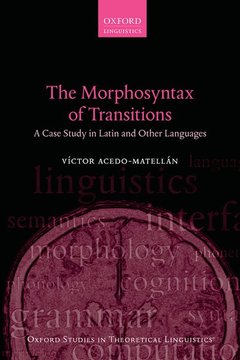The Morphosyntax of Transitions A Case Study in Latin and Other Languages Oxford Studies in Theoretical Linguistics Series, Vol. 62
Langue : Anglais
Auteur : Acedo-Matellán Víctor

This book examines the cross-linguistic expression of changes of location or state, taking as a starting point Talmy's typological generalization that classifies languages as either 'satellite-framed' or 'verb-framed'. In verb-framed languages, such as those of the Romance family, the result state or location is encoded in the verb. In satellite-framed languages, such as English or Latin, the result state or location is encoded in a non-verbal element. These languages can be further subdivided into weak satellite-framed languages, in which the element expressing result must form a word with the verb, and strong satellite-framed languages, in which it is expressed by an independent element: an adjective, a prepositional phrase or a particle. In this volume, Víctor Acedo-Matellán explores the similarities between Latin and Slavic in their expression of events of transition: neither allows the expression of complex adjectival resultative constructions and both express the result state or location of a complex transition through prefixes. They are therefore analysed as weak satellite-framed languages, along with Ancient Greek and some varieties of Mandarin Chinese, and stand in contrast to strong satellite-framed languages such as English, the Germanic languages in general, and Finno-Ugric. This variation is expressed in terms of the morphological properties of the head that expresses transition, which is argued to be affixal in weak but not in strong satellite-framed languages. The author takes a neo-constructionist approach to argument structure, which accounts for the verbal elasticity shown by Latin, and a Distributed Morphology approach to the syntax-morphology interface.
Victor Acedo-Matellán is currently a Junior Research Fellow in Linguistics at Queens' College, Cambridge. He has a PhD from the Universitat de Barcelona and has held positions at the Institut d'Estudis Catalans, the Universitat Autònoma de Barcelona, and the Universidade do Minho, Braga. His research on verbal syntax and argument structure has been published in journals including Probus and Linguistic Analysis, and in edited volumes published by OUP and John Benjamins.
Date de parution : 02-2016
Ouvrage de 330 p.
16.2x24 cm
Thème de The Morphosyntax of Transitions :
© 2024 LAVOISIER S.A.S.



